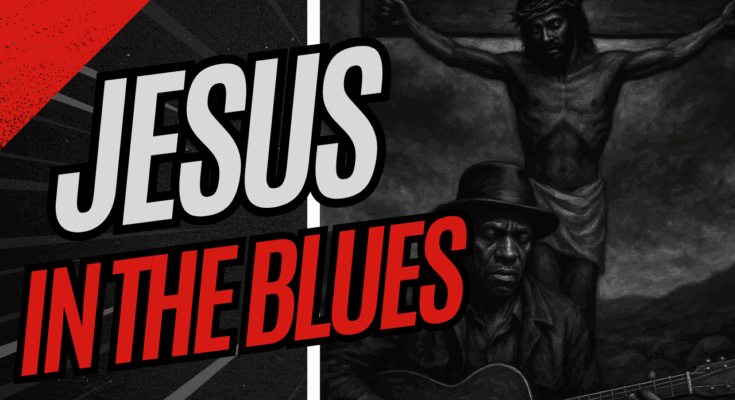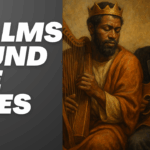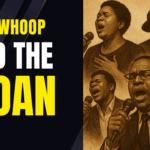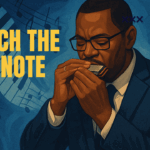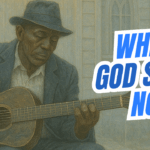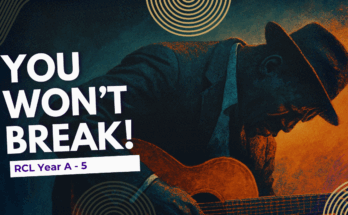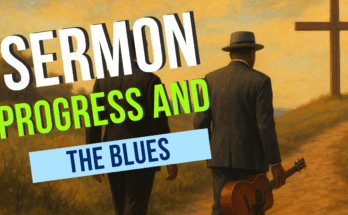As an Amazon Associate I earn from qualifying purchases.
James Cone once declared that “Jesus is Black.” By this, he didn’t mean melanin; he meant that Jesus identifies with the oppressed, the disinherited, the crucified peoples of the world.
Howard Thurman, in Jesus and the Disinherited, made the same claim in different language: Jesus is the companion of the poor, the one with “their backs against the wall.” Jesus knows what it means to live under empire, to suffer rejection, to be treated as nobody.
Blues theology picks up that thread and puts it in song. It says: when Jesus became flesh, He did not sidestep the blues. He chose to walk the blues way—the path of lament, struggle, and survival. He didn’t bypass sorrow. He entered it. He didn’t float above human pain. He carried it in His own body.
So who is Jesus in blues theology? He is our fellow sufferer, our truth-teller, our companion at the crossroads, our brother blues traveler. Let’s hear His life through the five notes of pentatonic blues thought.
Truth-Telling (Naming the Pain)
The blues has always been honest. It tells you the truth with no sugar. B.B. King sang, “Every day I have the blues.” Sam Cooke sighed, “It’s been a long, a long time coming.” Bill Withers moaned, “Ain’t no sunshine when she’s gone.” That’s not optimism—that’s honesty.
Jesus sang the same kind of song. He said, “Foxes have holes, and birds have nests, but the Son of Man has nowhere to lay his head” (Luke 9:58). He told His disciples, “In this world you will have tribulation” (John 16:33). On the cross, He cried, “My God, my God, why have you forsaken me?” (Mark 15:34).
Jesus did not sidestep the pain. He named it. He told the truth. That’s the first note of a blues Christology.
And the old spiritual joins in: “Sometimes I feel like a motherless child, a long way from home.” That’s truth-telling. That’s blues preaching. That’s Jesus.
Lament (Feeling It Fully)
The blues doesn’t just state the facts; it moans them. It feels the pain all the way down. Think of Bill Withers again: “Ain’t no sunshine when she’s gone, and she’s always gone too long.” Simple. Repetitive. Aching. That’s lament.
Jesus entered that space. He wept at Lazarus’s tomb (John 11:35). He cried over Jerusalem (Luke 19:41). In Gethsemane He said, “My soul is overwhelmed with sorrow to the point of death” (Mark 14:34). He begged His disciples, “Could you not watch with me one hour?” (Mark 14:37). And they slept while He sweated drops of blood.
He did not sidestep lament. He groaned with us. He moaned our moans.
And the spiritual answers back: “Were you there when they crucified my Lord? Oh, sometimes it causes me to tremble, tremble, tremble.” That song doesn’t explain the cross; it trembles before it. That’s lament. That’s Jesus.
Memory (What God Has Done)
The blues never sings in a vacuum. It always carries memory. Blind Willie Johnson’s “Dark Was the Night, Cold Was the Ground” is not just one man’s moan; it’s the memory of a whole people’s struggle. Bessie Smith’s “Back Water Blues” remembers the 1927 flood, but it also recalls centuries of hardship.
Jesus carried memory, too. In the synagogue at Nazareth, He read Isaiah: “The Spirit of the Lord is upon me…” and declared, “Today this scripture is fulfilled in your hearing” (Luke 4:18–21). At the Last Supper, He gave bread and cup and said, “Do this in remembrance of me” (Luke 22:19). On the cross, He sang Psalm 22: “My God, my God, why have you forsaken me?”
Howard Thurman noted that the memory of God’s deliverance gave hope to the disinherited. Jesus Himself leaned on that memory. He didn’t sidestep the old songs—He sang them forward into His own suffering.
And the spiritual joins Him: “Didn’t my Lord deliver Daniel? And why not every man?” Memory becomes courage. That’s blues Christology.
Resistance (Declaring God’s “No”)
The blues resists despair by singing anyway. Aretha Franklin’s “Respect” is a demand for dignity. Marvin Gaye’s “What’s Going On” is a lament that turns into a protest. Sister Rosetta Tharpe’s “99 and a Half Won’t Do” is a refusal to live halfway.
Jesus also resisted. He overturned tables in the Temple: “My house shall be called a house of prayer, but you make it a den of robbers” (Matthew 21:13). He called Herod a fox (Luke 13:32). At Gethsemane, He resisted the easy way and said, “Not my will but yours be done” (Luke 22:42).
And His very incarnation is resistance: “The Word became flesh and dwelt among us” (John 1:14). God didn’t stay aloof; God entered the struggle. That’s God’s “No” to sin and death.
The freedom song rises here: “Ain’t gonna let nobody turn me around.” That’s resistance in a groove. That’s Jesus in the blues key.
Hope and the Groove (The Rise)
The blues doesn’t end in despair. It finds a groove you can walk on. Wynton Marsalis said the blues is never just the “I”—it’s the “us.” The groove keeps the community moving, even when the lyrics are heavy.
Rev. Gary Davis sang, “Death don’t have no mercy in this land.” That’s not just his truth—it’s everybody’s truth. Death visits every house. That’s the universal groove.
And this is where Jesus’ incarnation cuts deepest: He didn’t sidestep that groove. He stepped into it with us. He lived our life and faced our death. Like all of us, He had to breathe His last and say, “Father, into your hands I commend my spirit” (Luke 23:46).
That’s how far He went. That’s how deep His solidarity goes. Jesus is not the one who avoided the blues—He is the brother who walked the blues way all the way to the grave.
The Theological Blue Note
Here’s where the question bends like a guitar string: is Jesus the blues made flesh? Some might say yes—His whole life moans with sorrow, sings with truth, and grooves with hope.
But maybe it’s enough to say this: Jesus did not sidestep the blues. He chose to walk that road. He is our fellow blues traveler.
Howard Thurman said Jesus speaks directly to “the disinherited.” The blues says He moans with those who moan. Together they testify: Jesus is with us in the ache, the moan, the groove, and even in death itself.
Conclusion – Friday Evening
And so we do not rush to Sunday morning. The blues teaches us to stay with Friday night.
We leave Jesus where the gospel leaves Him at the end of that day: hanging between two thieves, breathing His last, whispering, “Into thy hands I commend my spirit.”
That is the depth of His connection with us. He didn’t sidestep hunger. He didn’t sidestep grief. He didn’t sidestep betrayal. And He didn’t sidestep death.
Jesus is our fellow brother blues traveler. He walks the same road we walk. He keeps the same groove we keep. And on Friday night, He entered the silence every one of us must face.
He did not sidestep the blues.
—
Nevertheless, I would be remiss if I didn’t say:
“But early Sunday morning…”
Amazon and the Amazon logo are trademarks of Amazon.com, Inc, or its affiliates.

